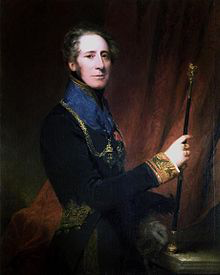Regency Personalities Series-Admiral Sir Augustus William James Clifford
Regency Personalities Series
In my attempts to provide us with the details of the Regency, today I continue with one of the��many period notables.
Admiral Sir Augustus William James Clifford
26 May 1788 ��� 8 February 1877

Augustus William James Clifford
Admiral Sir Augustus William James Clifford was born in France in 1788, the illegitimate son of William Cavendish, 5th Duke of Devonshire (and 7th Baron Clifford), and Lady Elizabeth Foster, daughter of Frederick Hervey, 4th Earl of Bristol. Not long after his birth, his mother brought him to England, to be wet-nursed by Louisa Augusta Marshall, wife of the Revd John Marshall, curate at Clewer, near Windsor, Berkshire. Clifford was educated at Harrow School, 1796-99. His parents married in 1809, their respective spouses having died.
He married, on 20 October 1813, Lady Elizabeth Frances Townshend (2 August 1789���10 April 1862 Nice), sister of John Townshend, 4th Marquess Townshend. Each of his sons, Capt William RN, Robert and Charles succeeded their father in turn as the second, third and fourth (and final) baronets.
Clifford was a patron of the arts, and formed a unique collection of paintings, sculpture, etchings, engravings, and bijouterie. He died at his residence in the House of Lords in 1877.
Clifford entered the Royal Navy as a midshipman in May 1800, and was promoted to a lieutenancy in 1806. He served at the reduction of Ste. Lucie and Tobago in 1803, and throughout the operations in Egypt during 1807. He was at the capture of a convoy in the Bay of Rosas in 1809 (for which he received a medal) and in the operations on the coast of Italy 1811���12.
After this, as captain, he was for many years actively employed in naval duties, being several times mentioned in the London Gazette for his courage in cutting-out expeditions and on other occasions. For some time he was engaged in attendance on the Lord High Admiral, the Duke of Clarence, afterwards William IV, and in 1828 he took Lord William Bentinck out to India as governor-general. This was his last service afloat, and he was not actively employed after 1831.
He reached the rank of rear-admiral 23 March 1848, vice-admiral 27 September 1855, Admiral of the Blue 7 November 1860, and Admiral of the Red 1864, becoming retired admiral 31 March 1866.
He was Member of Parliament for Bandon 1818���20; for Dungarvan, 1820���2; and again for Bandon from 23 July 1831 to 3 Dec. 1832. He was nominated a Commander of the Order of the Bath on 8 December 1815, knighted on 4 August 1830, and created a baronet on 4 August 1838. His half-brother, the 6th Duke of Devonshire (then Lord Chamberlain), appointed him on 25 July 1832 Gentleman Usher of the Black Rod, which office he held, much to his satisfaction, until his death. On various occasions between 1843 and 1866 he acted as deputy lord great chamberlain of England, in the absence of Lord Willoughby d’Eresby.




